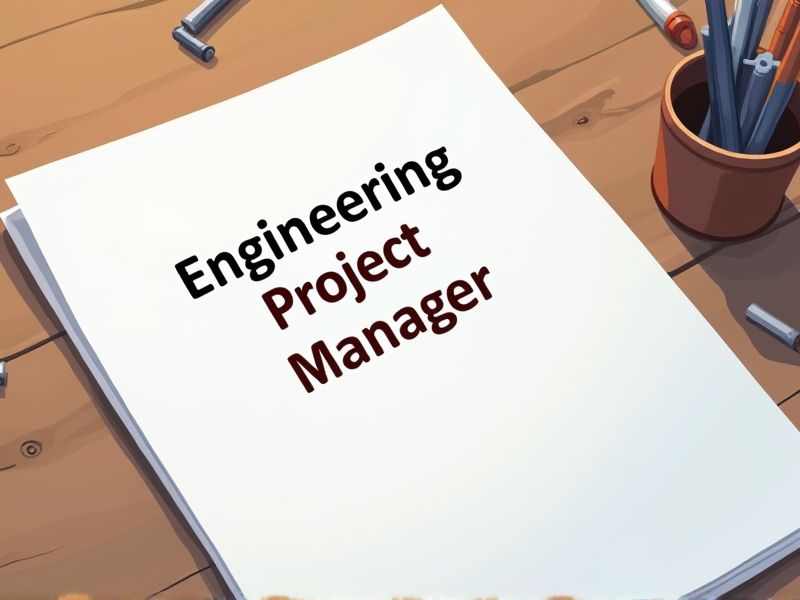
Engineering Project Managers handle complex, multidisciplinary projects which require robust leadership and engineering skills. Certifications provide proof of proficiency in key areas like project management, risk assessment, and technical methodologies. Employers often regard these certifications as benchmarks of professional standards, ensuring projects are managed efficiently and cost-effectively. Here are some essential certifications for an Engineering Project Manager.
Project Management Professional (PMP)
The PMP certification provides engineering project managers with a standardized framework, ensuring consistent project execution and successful outcomes. This certification equips managers with essential skills in risk management, leading to reduced project delays and cost overruns. Employers frequently recognize PMP as a mark of professionalism, increasing job prospects and career advancement for engineering managers. With PMP training, project managers are better prepared to handle complex engineering projects, improving stakeholder communication and collaboration.
Certified Associate in Project Management (CAPM)
Pursuing a Certified Associate in Project Management (CAPM) enhances an engineering project manager's credibility and professional standing. CAPM certification equips managers with essential project management methodologies, which helps in maintaining efficient workflow and minimizing risks in engineering projects. Understanding standardized project processes through CAPM aids in streamlining communication and collaboration across multi-disciplinary teams. Companies prefer hiring or promoting CAPM-certified managers as it ensures adherence to globally recognized project management practices that improve project success rates.
PMI Agile Certified Practitioner (PMI-ACP)
The PMI Agile Certified Practitioner (PMI-ACP) certification is essential for an Engineering Project Manager because it demonstrates expertise in agile principles and practices which are crucial for managing complex engineering projects efficiently. Engineering projects often encounter rapid changes and uncertainties, and the PMI-ACP validates the manager's capability to adapt and respond effectively to these challenges. This certification ensures that the manager is equipped with advanced agile tools and techniques to enhance team collaboration and deliver high-quality outcomes. Organizations increasingly value adaptive strategies, hence having a PMI-ACP provides a competitive advantage in meeting client expectations and project demands.
PRINCE2 Practitioner
Having a PRINCE2 Practitioner certification ensures an Engineering Project Manager has a structured project management approach that aligns with best practices. This qualification enhances the ability to manage projects efficiently through clearly defined roles and responsibilities. It helps in delivering projects on time and within budget by employing adaptable methodologies. Competency in PRINCE2 principles fosters stakeholder confidence as it underscores professionalism and expertise in handling complex projects.
Lean Six Sigma Green Belt
Lean Six Sigma Green Belt training equips an Engineering Project Manager with skills to identify and eliminate inefficiencies, leading to optimized project processes. This expertise helps in reducing project timelines and costs while maintaining quality standards. Knowledge in Lean Six Sigma methods empowers managers to use data-driven decision-making tools, effectively improving project outcomes. Strong problem-solving capabilities gained through Green Belt training enhance the project manager's ability to address complex engineering challenges systematically.
Lean Six Sigma Black Belt
Having expertise in Lean Six Sigma Black Belt enables an Engineering Project Manager to streamline processes, reduce waste, and increase efficiency, contributing significantly to project success. The data-driven decision-making skills gained through this certification allow for precise problem-solving and risk management, which are crucial in complex engineering projects. Implementing Lean Six Sigma principles results in higher quality outcomes and cost savings, directly impacting the project's bottom line. Furthermore, possessing such a certification often increases credibility and fosters trust within project teams and stakeholders, reinforcing leadership effectiveness.
Certified ScrumMaster (CSM)
Engineering project managers often encounter complex, fast-paced projects, and acquiring a Certified ScrumMaster (CSM) credential equips them with agile methodologies, leading to more efficient project delivery. By understanding Scrum principles, these managers can better facilitate team collaboration and adaptability, enhancing overall project outcomes. The CSM certification provides tools for effective problem-solving and requirement adjustments, decreasing risks related to project scope and timeline changes. Engineering projects often require cross-functional team coordination, which the CSM training supports by improving communication and reducing bottlenecks.
Professional Engineer (PE) License
A Professional Engineer (PE) license is crucial for an Engineering Project Manager because it validates their technical skills and expertise. It ensures that they comply with industry standards and regulations, which can mitigate risks during project execution. Clients and stakeholders often perceive licensed professionals as more credible, enhancing trust and communication. Having a PE license provides a competitive edge in the job market, potentially leading to more leadership opportunities and higher compensation.
Certified Cost Professional (CCP)
Becoming a Certified Cost Professional (CCP) equips an engineering project manager with advanced cost management skills, enhancing decision-making abilities regarding budgets. This certification signifies a deep understanding of cost estimation, budgeting, and financial control, leading to more effective project execution. In complex engineering projects, accurate cost management often determines the project's success or failure, and having a CCP fosters this accuracy. Evidence shows that project managers with CCP credentials tend to achieve better financial performance, aligning project outcomes with business objectives.
PMI Risk Management Professional (PMI-RMP)
Engineering projects often involve complex risk factors; PMI Risk Management Professional (PMI-RMP) certification equips managers with the skills to identify and mitigate potential risks efficiently. Projects exceeding budgets or timelines often result from unforeseen risks, and an RMP-certified manager can use their expertise to minimize such occurrences. Engineering projects demand precise coordination between teams and resources, and a PMI-RMP credential ensures a manager is adept in maintaining a balanced project environment. Hiring professionals with this certification can lead to improved project outcomes, as they are trained to apply structured risk assessment methodologies.
Summary
As an Engineering Project Manager, obtaining certifications enhances your leadership and technical skills. This leads to improved project efficiency and better client satisfaction. You may also experience increased career opportunities and potential salary growth. Certifications position you as a credible and knowledgeable authority among peers and stakeholders.
